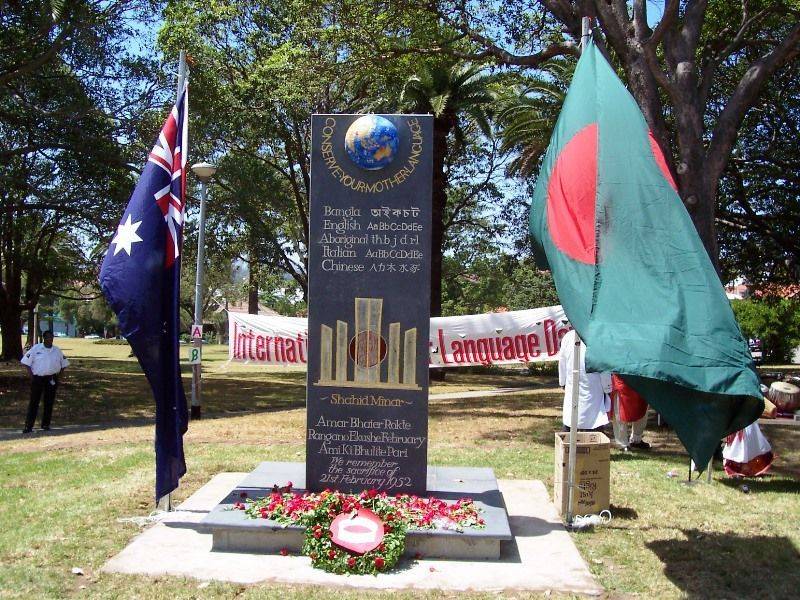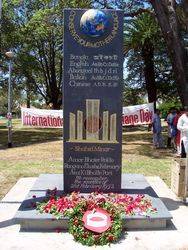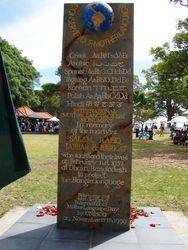
International Mother Language Day Print Page 
The monument commemorates International Mother Language Day and is in memory of Salam, Rafiq Jabbar & Barkat who sacrificed their lives in 1952 at Dhaka, Bangladesh to protect the Bangla language.
DHAKA (Bangladesh) — The Central Shaheed Minar was flooded with flowers as thousands of barefoot people, wearing black badges and holding bouquets thronged there on Feb. 21, 2010 to pay homage to the brave sons of the soil who laid down their lives in 1952 for mother tongue Bangla.
Amid tight security arrangements, President Zillur Rahman and Prime Minister Sheikh Hasina placed wreaths at the Central Shaheed Minar two minutes past midnight last night and stood in solemn silence for a few moments to pay respect to the martyrs. Different organisations placed bouquets and wreaths, many went there with a single rose or a tuberose, toddlers holding their mothers' hands or riding on their fathers' shoulders. Freedom fighters, language movement veterans, physically challenged people, youths, day labourers, workers, homeless people, academicians, intellectuals, politicians and foreigners walked in queues.
On this day in 1952, students and people from all strata of society took to the streets in Dhaka to protest the then Pakistan government's refusal to recognize Bangla as one of the state languages and imposition of Urdu as the only official language of Pakistan. Salam, Barkat, Rafiq, Shafiur, Jabbar and a few other brave sons of the soil sacrificed their lives on this day to establish Bangla as one of the state languages of the then Pakistan. The day has since been observed as the Language Martyrs' Day, which the UNESCO later declared as the International Mother Language Day.
The then Pakistan government was ultimately compelled to include an article in the country's constitution on February 29, 1956 that declared, "The state languages of Pakistan shall be Urdu and Bengali."
The Language Movement is indeed the most important turning point in the history of Bangalees as its spirit led to the independence of Bangladesh through a bloody nine-month war in 1971.
On November 17, 1999, the UNESCO declared February 21 as the International Mother Language Day. Countries across the globe have been observing the day since then to promote linguistic diversity and multilingual education and raise awareness of cultural traditions based on understanding, tolerance and dialogue.
The Seoul Times, 13 July 2020.
International Mother Language Day is an observance held annually on 21 February worldwide to promote awareness of linguistic and cultural diversity and multilingualism. It was first announced by UNESCO on 17 November 1999. Its observance was also formally recognized by the United Nations General Assembly in its resolution establishing 2008 as the International Year of Languages.
Location
| Address: | Ormond Street, Parramatta Road & Orpington Street, Ashfield, 2131 |
|---|---|
| State: | NSW |
| Area: | AUS |
| GPS Coordinates: | Lat: -33.886111 Long: 151.135556 Note: GPS Coordinates are approximate. |
Details
| Monument Type: | Monument |
|---|---|
| Monument Theme: | Culture |
| Sub-Theme: | Community |
Dedication
| Actual Monument Dedication Date: | Sunday 19th February, 2006 |
|---|
Conserve your mother language
Bangla
English
Aboriginal
Italian
Chinese
Shahid Minar
Amar Bhaier Rokte
Rangano Ekushe February
Ami Ki Bhulite Pari
We remember the sacrifice of 21st February 1952
Conserve your mother language
Greek
Arabic
Spanish
Tagalog
Korean
Polish
Hindi
International Mother Language Day Monument
In memory of the martyrs Salam, Rafiq, Jabbar & Barkat who sacrificed their lives on February 21st 1952 at Dhaka, Bangladesh to protect the Bangla language
February 21st was declared International Mother Language Day by UNESCO on November 17th 1999






 Monument Design
Monument Design
